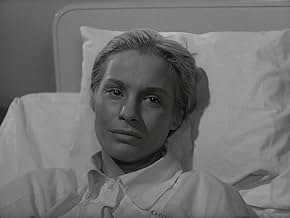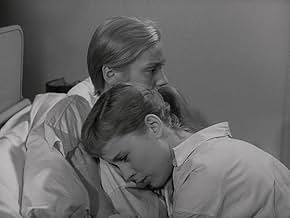अपनी भाषा में प्लॉट जोड़ेंThree women in a maternity ward reveal their lives and intimate thoughts to each other, where they face the choice of keeping their babies or offering them for adoption.Three women in a maternity ward reveal their lives and intimate thoughts to each other, where they face the choice of keeping their babies or offering them for adoption.Three women in a maternity ward reveal their lives and intimate thoughts to each other, where they face the choice of keeping their babies or offering them for adoption.
- पुरस्कार
- 3 जीत और कुल 1 नामांकन
- Nurse
- (बिना क्रेडिट के)
- Father with injured child
- (बिना क्रेडिट के)
- Hjördis' friend
- (बिना क्रेडिट के)
- Maud, nurse student
- (बिना क्रेडिट के)
- Night nurse
- (बिना क्रेडिट के)
- Mari, nurse
- (बिना क्रेडिट के)
- Dr. Larsson
- (बिना क्रेडिट के)
- Dr. Thylenius
- (बिना क्रेडिट के)
कहानी
क्या आपको पता है
- ट्रिवियाThere is no musical score, just a few bars from a radio at 10.55 pm. The tune played is Sweden's national anthem indicating the end of the broadcast that day.
- भाव
Hjördis Petterson: They think I'm horrible. I think so too. I think I'm horrible. I don't want to answer like I do, but the words just fall from my lips. I bite their heads off although I don't mean it. Then at night when I can't sleep I get so angry with myself. Everything just keeps growing and growing. And I always end up at the very bottom. Whatever I do, things just go wrong. I don't know what to do.
As the two previous reviewers have observed, this little-mentioned film is a classic of its own, dealing with a most challenging and difficult phase of life undeservedly neglected by directors, male or female. Numerous thoughts passed through my mind while viewing it. For those who have experienced some of the events in the film, it rings true. Bergman, with the assistance of the excellent script by Ulla Isaksson, is able to penetrate female psychology about this very elemental subject and to elicit powerful and honest performances from all of his actors. To say that Bergman proves himself to be both psychologist and psychiatrist of the female psyche would not be an exaggeration. But here in 1958 he feels no need for the pathology of "Cries and Whispers," or the sexual neuroses of "Persona."
The setting is "given," almost like a stage play, as it takes place in mainly two rooms of a hospital, and the situation of each of the three women, while different, might even seem a tad "set" or "canned." But as their situations unfold, and as we are drawn into each dilemma, we see how vital this inter-action is between them, between them and the head nurse, and between each of their spouses and lover. From the intensity of being alone (as we see in vivid closeups), their circle of life is gradually drawn wider, encompassing others and us in it. Ultimately, we see how this inter-action deeply affects each of them.
From the standpoint of film making, we can feel how much Bergman loved the archetype Woman, and felt compelled to present in as straightforward and sympathetic a way possible, without melodrama or sentimentality, her predicament as Child-bearer. We are given insight into her innermost fears (what woman has not feared pregnancy before marriage, or a miscarriage, or an abnormal or still birth, an indifferent lover or spouse?), and we are shown how some kind of closure or resolution might be offered through an honest reaching out and sharing of those fears with someone who listens and sympathizes without judgment. Bergman's genius was the ability to reach into the female psyche, to gain the trust of his actors, to allow them to reveal themselves in this most intimate and personal of human emotions and acts, and to make a statement about greeting and accepting life as well as death. He must have obtained this insight early on in life, and for that gift we must thank his mother Karin.
One final note about the men in these women's lives. Ingrid Thulin is matched with Erland Josephson, Eva Dahlbeck with Max von Sydow, and Bibi Andersson speaks on the phone with her lover. Both Josephson and Sydow look very young, much younger than the women appear. Josephson plays a role we seldom see him in, that of the rather unsympathetic spouse, a bit too caught up in himself and appearances.
His sister, interceding for him, is the beautiful and strong, but rarely seen Inga Landgr~{(&~}. Max von Sydow plays a young, very young husband to Dahlbeck -- he seems almost like an adolescent here, even though he was in the "Magician" the same year and "Seventh Seal" the year before. Bibi's errant young man is suitably absent
If we are to read their roles as legitimately portrayed, then I wonder what Bergman was trying to say about Man vis a vis Woman during this phase of pregnancy and childbirth? I hesitate to speculate, but it is almost one of helplessness, even fecklessness, in the face of a life force that is greater than himself.
In all a film of **** well worth searching for and best seen in company with "Karin's Face" if at all possible. I would recommend that all medical students see it, and anyone contemplating childbirth.
टॉप पसंद
- How long is Brink of Life?Alexa द्वारा संचालित
विवरण
- चलने की अवधि1 घंटा 24 मिनट
- रंग
- ध्वनि मिश्रण
- पक्ष अनुपात
- 1.37 : 1
इस पेज में योगदान दें


































